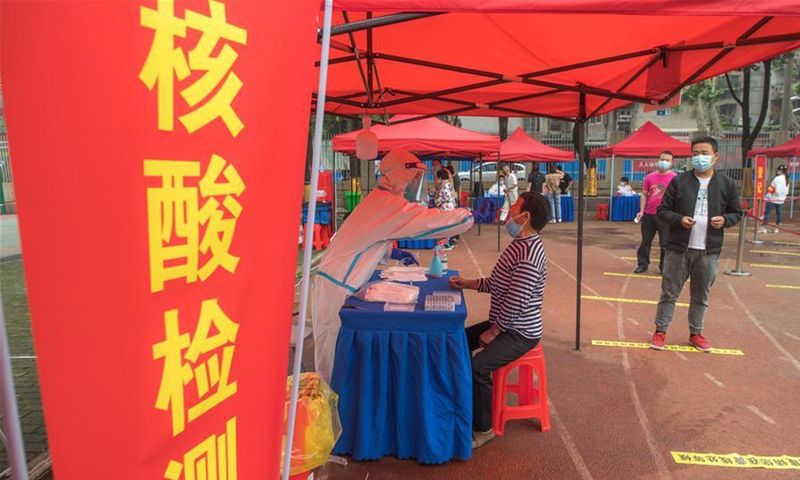China prepares for epidemic rebound in autumn, winter
By Liu Caiyu and Wang Qi Source: Global Times Published: 2020/7/13 20:08:40

Residents take nucleic acid tests at a testing post set up at a primary school in Dongxihu District in Wuhan, central China's Hubei Province, May 15, 2020. Wuhan will arrange nucleic acid tests for all residents who have not been tested before, in order to better know the number of asymptomatic cases of the novel coronavirus. The decision was made as the virus-ravaged city continued to report daily increases of asymptomatic infections, which raised concerns among the public. (Xinhua/Xiao Yijiu)
Chinese cities such as Wuhan and Beijing are planning for a new wave of the coronavirus epidemic in the autumn and winter as the nation - where the epidemic has been basically brought under control - still faces risks.
Experts said there may be unknown causes of infections, regional outbreaks created by imported cases, and a dual attack of the epidemic and influenza.
Some Chinese experts said a second wave is not likely as the virus has no apparent temperature preference, but the nation should still prepare for dual outbreaks.
The pandemic will continue into the winter and the situation might get even worse by then, chief epidemiologist Wu Zunyou from the Chinese Center for Disease Control and Prevention, warned during an anti-epidemic forum on Sunday.
Three months after Wuhan, Central China's Hubei Province lifted the citywide lockdown on April 8, monitoring for COVID-19 continued. More than 80,000 environmental samples collected in the past month were negative for the COVID-19.
Wuhan authorities have taken environmental samples in supermarkets, farmer's markets and public toilets since June 13.
Wang Guangfa, a respiratory expert at Peking University First Hospital, told the Global Times that the majority of the Chinese population has no immunity to COVID-19, and influenza outbreaks in autumn and winter could make it harder for China to combat a new COVID-19 epidemic.
Chinese cities should strengthen their epidemic monitoring capability, differentiate between influenza and COVID-19, and produce easy detection kits for COVID-19, Wang said.
Wang Peiyu, a deputy head of Peking University's School of Public Health, stressed the importance of the "Four Earlies" strategy (early detection, reporting, isolation/quarantine, and treatment). "If people have symptoms, go to a fever clinic and get a nucleic acid test as soon as possible to avoid further infection."
To deal with a possible rebound, the Wuhan Health Commission held a special meeting on the deployment of medical treatment on June 19.
In an emergency response scheme, the Wuhan government urged all medical institutes, from September this year, to get fever clinics and quarantine wards ready, build up a 30-day stock of epidemic materials, and train personnel.
The Beijing government said on July 10 that it is looking at preparations for a new wave of COVID-19 later this year. Beijing officials said the best way to prevent an epidemic is to follow proper procedures in personal protection, wear masks, wash your hands frequently and maintain social distancing.
Wu said that the grim situation in Wuhan early this year is unlikely to be repeated in China.
But Wu said China still faces two kinds of pressure. One is an outbreak of unknown cause, like the one in Wuhan's seafood market and the resurgence in Beijing's Xinfadi market. The other is a regional spread caused by imported cases, like what happened in Northeast China's Shulan and Suifenhe.
Liang Manchun, an associate research fellow at the Institute for Public Safety Research of Tsinghua University, told the Global Times that these two factors would still pose a risk for China, which needed to prepare for a long-term fight against the virus.
But "as China gained vast experience in Wuhan and Beijing, the country is capable of eliminating any sign of an epidemic," said Liang.
If the virus' origin can be found and vaccines developed in the coming months, an epidemic could also be prevented.
Wang Peiyu said that ports and customs facilities should conduct timely, thorough testing and quarantine as China's international routes gradually resume business while the global pandemic continues to spread.
RELATED ARTICLES:
Posted in: SOCIETY,CHINA FOCUS